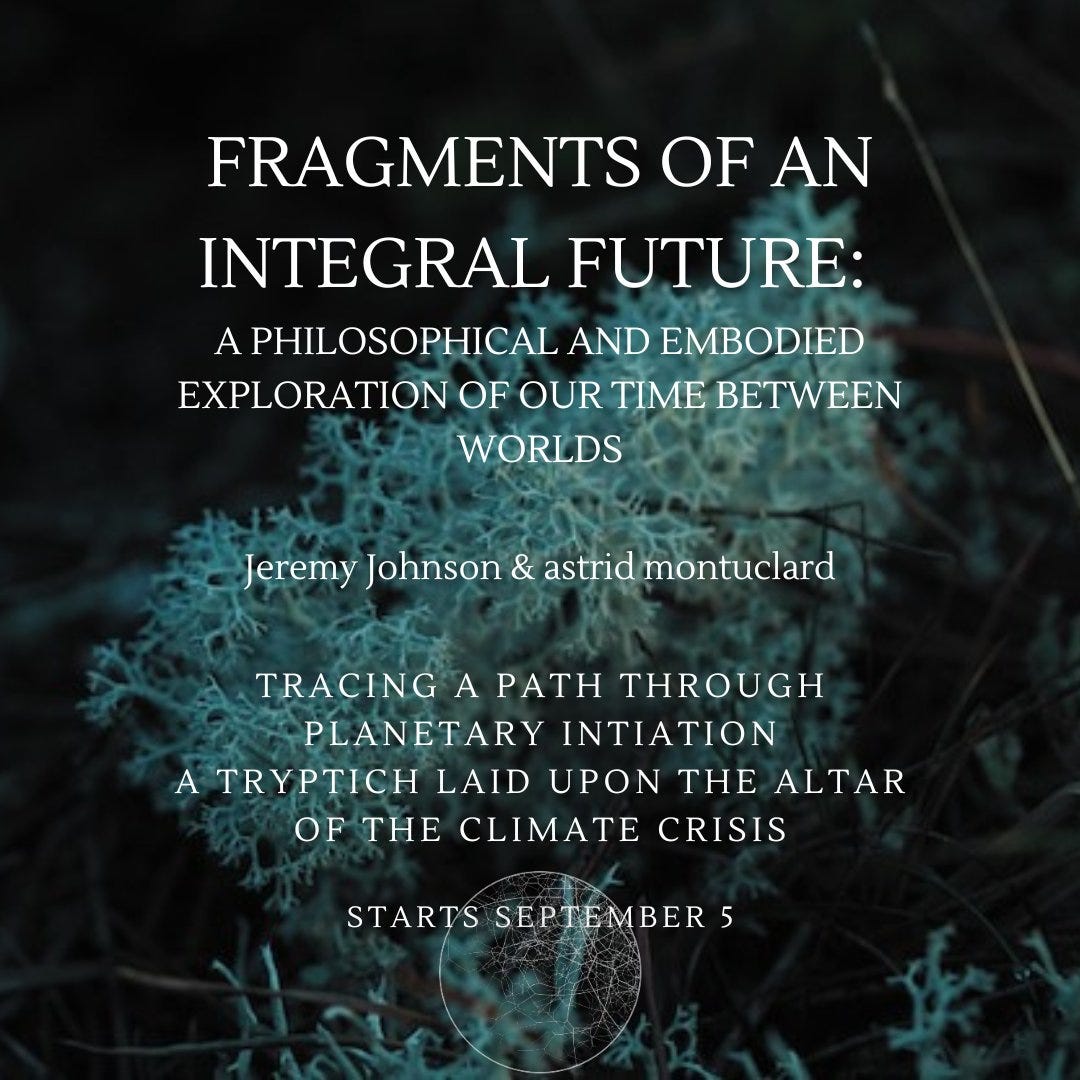Starting Today: Fragments of an Integral Future
Join me for my opening session, plus announcing the return of Mutations salon.
Today at 9:39 am PT / 12:30 pm ET is the kickoff session of “Fragments of an Integral Future.”
Registration for the class will remain open for all seven weeks — each session is recorded and available for re-viewing at your own pace.
I’ll be offering the opening lecture tomorrow, “Rhizomes, Mycelia, Lichen and the Planetary Imaginary.” If you’re keen to learn what all those things have in common, consider this an invitation.
Later this evening, Michael Garfield’s Jurassic Worlding series concludes: join us for our final riff on Jurassic Park, monsters, A.I., and past-present-future high weirdness 4 pm PT / 7 pm ET. Zoom link is shared in the paid subscriber area.
Finally, on Wednesday, I’m pleased to announce the return of the Mutations salon: we’ll be meeting for the next seven weeks at 4 pm PT / 7 pm ET. Zoom link is also shared below.
“The main point is that insofar as biopolitics is concerned, this question of ecosystem assemblages is the name of the game of life on Earth.”
- Donna Haraway
Although I can’t get into the details of the lesson, I can talk around the class and recommend what amounts to “show notes” for it: do youself a favor and watch this recording of Lynn Margulis doing circles around Richard Dawkins in a debate about the selfish gene and symbiogenesis. Conner Habib, a kindrid intellectual spirit and friend of the Mutations project, shared this lengthy commentary on the debate. Conner’s interview with Lynn (the last one recorded before her death in November of 2011) is touching and also highly recommended.
I’ll be assigning John Feldman’s 2017 documentary, Symbiotic Earth, to the class.
Finally, if you’re looking for books, Conner recommends Symbiotic Planet (2008) and Acquiring Genomes: A Theory on the Origins of Species (2008). I’d also recommend Microcosmos (1997) for a good introduction. The last chapter, “Supercosmos,” is what I’d describe as an “ecodelic” vision of Earth’s evolutionary future. Twenty-five years later, in the heat of the anthropocene it lands a little differently—but that’s precisely why I’m interested in sharing some of its implications with the class.
There’s a lot more that’s going into lesson I. Thomas Halliday’s Otherlands (2022), with his notion of “temporal wonderlust” is a key idea I’ve run with for the class, generally speaking, and then there’s Emanuelle Coccia’s Metamorphoses (2021), which has really helped nudge the Fragments book writing a little closer towards completion in profound ways.
Finally, I’m going back to William James and A Pluralistic Universe (1909) because there is something friendly in his pluralism with the epistemic humility of contemporary ecological thought (Latour, for instance, or Stengers).
"All that my pluralism contends for is that there is no where extant a complete gathering up of the universe in one focus, either of knowledge, power, or purpose. Something escapes, even from God.”
So what is this class all about, precisely? Gathered from “show notes” above, it might sound like it has something to do with Gaia Theory and Lynn Margulis. The class, and the book, is really looking at new modes of thinking and being: thinking and being towards the planet. It’s a way of helping us explore how we can, as I’m fond of Bruce Clarke describing, “think like a living planet.” It’s a container for Gaian thinking and experimental practice.
Enough anticipatory talk, this kind of work suggests, how might our thinking and being really live the new mutation? Join us to find out, or at least stick around here.
More soon.
Keep reading with a 7-day free trial
Subscribe to Mutations to keep reading this post and get 7 days of free access to the full post archives.


